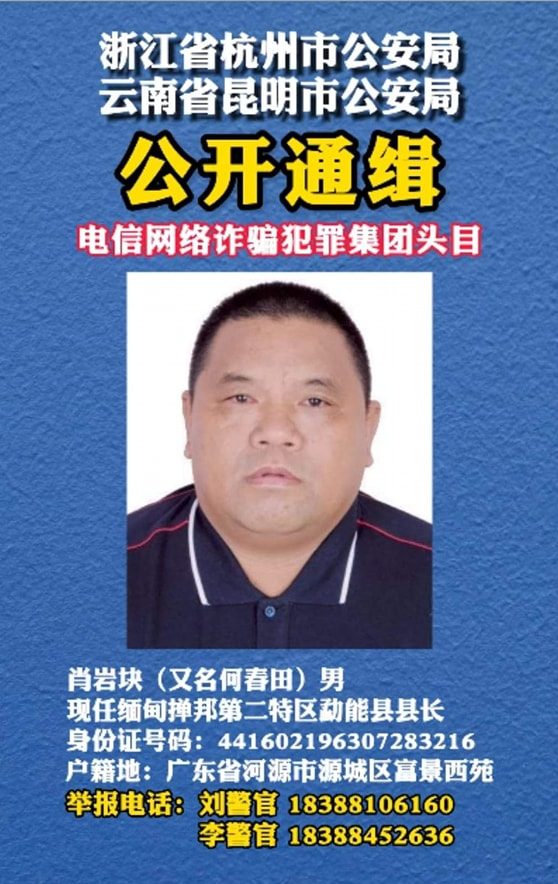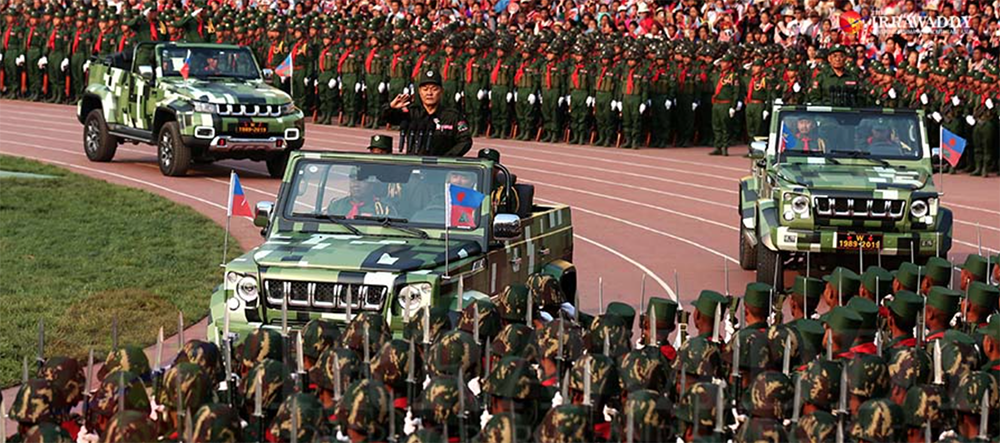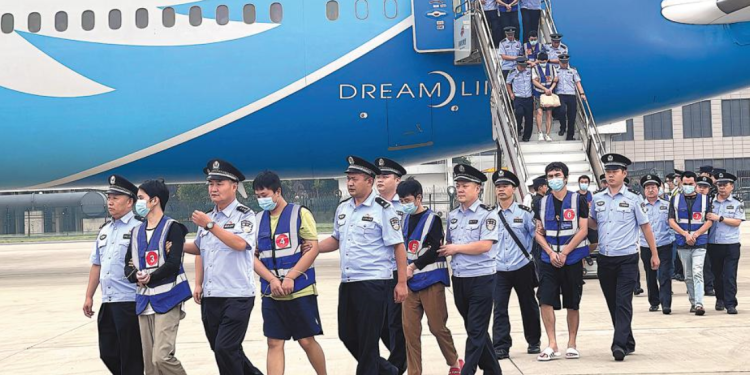One of the two high-ranking Wa officials Chinese police departments slapped with arrest warrants last week—Xiao Yanquan—is best known in Yangon for his links to the narcotics trade, money laundering, prostitution, and the junta that seized power after the 1988 uprising.
Arrests warrants were issued for him and Chen Yanban last week for allegedly running telecom fraud gangs in the autonomous region under the control of the United Wa State Army (USWA) near the border with China in northern Shan State.
Chen is the construction minister of Wa Self-Administered Division and was previously head of UWSA Brigade 468.
Xiao is the mayor of Monglin District and a son-in-law of former UWSA leader Bao Youxiang.
Xiao was a familiar—and colorful—face in business circles in the commercial capital of Yangon under the military regime that named itself the State Law and Order Restoration Council (SLORC).
He was head of the UWSA liaison office in Yangon while it was negotiating a ceasefire with the SLORC.
General Khin Nyunt, the highly feared military intelligence (MI) chief and Secretary 1 of the SLORC, led the peace negotiations that resulted in a ceasefire with the UWSA.
Xiao established close ties with senior officials in MI through the UWSA liaison office in Yangon. “Xiao played a key part in building links between the top businessmen of the UWSA and senior military officers,” a business source in Yangon said.
Although the UWSA was on the radar of Western countries for its narcotics trade, Xiao was known in Yangon’s for helping business people from Wa Self-Administered Division expand into the country’s commercial capital to launder money.

Xiao was also the owner and managing-director of Yangon Airways until 2010, when the SLORC rejected a plan to extend its license. He also chaired Tet Kham Co, which operated a hotel chain notorious for prostitution across Myanmar, and was involved in gem mining and construction through two companies that were sanctioned by Washington.
Xiao also held a substantial stake in Myanmar May Flower Bank, which was allegedly involved in money laundering that resulted in a banking crisis in 2003.
He was an “illiterate spendthrift fully backed by MI and Yangon City Development Committee [YCDC],” according to former Major Thaung Wai Oo, who had met Xiao in person. The YCDC is the administrative body of Yangon with oversight of construction, urban planning and taxation.
Xiao bought top-rated golf clubs for about 1 million kyats apiece and gave them away. His lavish lifestyle made him very popular, while officials from MI and the YCDC were ready to provide him with anything he wanted—usually women and liquor.
They even arranged Xiao to have sex with an indebted Academy Award-winning actress for 600,000 kyats, according to former Major Thaung Wai Oo who wrote a book about MI. The amount was no more than a tip for Xiao, Thaung Wai Oo wrote.
The business empire of Xiao and his Wa affiliates began collapsing after General Khin Nyint was purged, and his entire MI network was removed in 2004.
After 28 tons of heroin were found on a ship at Yangon Port bound for Singapore in January 2009, the SLORC started arresting business owners in Yangon suspected of being involved in the narcotics trade, including those from Wa and Kokang.
Xiao managed to flee back to the safety of UWSA territory, where he kept a low profile until his name appeared on a Chinese arrest warrant last week.

The warrants come as the Chinese government ramps up its efforts to crack down on scam syndicates operating near its border with Myanmar.
China this year pressured Myanmar’s junta to take action against cyber scams, which the Chinese Ministry of Foreign Affairs says have “seriously harmed Chinese interests.”
In the first week of September, the UWSA handed over 1,000 Chinese citizens involved in cyber scams to Chinese police.
When asked for more details about the crackdown by The Irrawaddy, UWSA liaison officer Nyi Rang said, “I still don’t know the details.” He added that he would have to ask the “higher-ups” for more information.
Earlier this month, the Chinese government detained 11 people with alleged ties to Myanmar junta-affiliated Kokang militias at its border across from northern Shan State. Three of the detainees are reportedly prominent local business owners.
They were arrested on October 1 after officials of the junta-appointed governing body of the Kokang Self-Administered Zone attended an expo and Chinese National Day celebrations in Lincang City of Yunnan Province at the invitation of China.

















